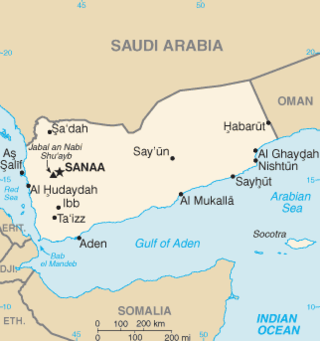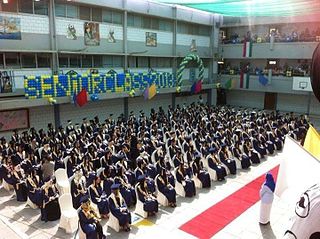Related Research Articles

Jamaat-e-Islami Pakistan (JIP), is a Pakistani Islamist political party. It is the Pakistani successor to Jamaat-e-Islami, which was founded in colonial India in 1941. JIP is a "vanguard party", whose members are intended to be leaders spreading party beliefs and influence. Supporters not thought qualified to be members may become "affiliates", and beneath them are "sympathizers". The party leader is called an "ameer". Although, it does not have a large popular following, the party is quite influential and considered one of the major Islamic movements in Pakistan, along with Deobandi and Barelvi.

Education in Bangladesh is administered by the country's Ministry of Education. The Ministry of Primary and Mass Education implements policies for primary education and state-funded schools at a local level. Education in Bangladesh is compulsory for all citizens until the end of grade eight. Primary and secondary education is funded by the state and free of charge in public schools.

Education in Pakistan is overseen by the Federal Ministry of Education and the provincial governments, while the federal government mostly assists in curriculum development, accreditation and the financing of research and development. Article 25-A of the Constitution of Pakistan obligates the state to provide free and compulsory quality education to children of the age group 5 to 16 years. "The State shall provide free and compulsory education to all children of the age of five to sixteen years in such a manner as may be determined by law".
The education system in Qatar is jointly directed and controlled by the Supreme Education Council (SEC) and the Ministry of Education and Higher Education (MOEHE) at all levels. The SEC is responsible for overseeing independent schools, whereas the MOE is responsible for providing support to private schools. Formal schooling officially began in 1956. Primary schooling is obligatory for every child and is free in public schools.

Public education in Saudi Arabia—from primary education through college—is open to every Saudi citizen. Education is the second-largest sector of government spending in Saudi Arabia. Saudi Arabia spends 8.8% of its gross domestic product on education, which is nearly double the global average of 4.6%. Saudi Arabia is an Islamic country and therefore Islam is interwoven in every part of society, also in education. Islamic studies are part of the education system alongside scientific and social studies that vary from educational institution to another. Important goals of education in Saudi Arabia are to teach the students the economic, religious and social norms of the country. They also want to reduce the high illiteracy. The education system consists of 3 levels: primary education, intermediate education and secondary education.
Masjid Mission Academy, Rajshahi (MMA), is a school and college in Ghoramara, Boalia Thana, Rajshahi, Bangladesh. It offers education for students ranging from first grade to twelfth grade. With over 6,000 students, MMA is one of the largest private schools in Rajshahi. It is located by the Padma River.

Education in the State of Palestine refers to the educational system in the Gaza Strip and the West Bank, which is administered by the Palestinian Ministry of Education and Higher Education. Enrollment rates amongst Palestinians are relatively high by regional and global standards. According to a youth survey in 2003, 60% between the ages 10–24 indicated that education was their first priority. Youth literacy rate was 98.2%, while the national literacy rate was 91.1% in 2006. The literacy rate ages 15-24 was 99.4% in 2016. Enrollment ratios for higher education were 45% in 2022. In 2016 Hanan Al Hroub was awarded the Varkey Foundation Global Teacher Prize for her work in teaching children how to cope with violence.
The Jamaat-e-Islami Kashmir or Jamaat-e-Islami Jammu and Kashmir (JIJK) is an Islamic political party based in the city of Srinagar in the Indian administered territory of Jammu and Kashmir. It is distinct from the Jamaat-e-Islami Hind. The organisation's stated position on the Kashmir conflict is that Kashmir is a disputed territory and the issue must be sorted as per UN or through tripartite talks between India, Pakistan and representatives of Kashmir.

Yemen ranked 150 out of 177 in the 2006 Human Development Index and 121 out of 140 countries in the Gender Development Index (2006). In 2005, 81 percent of Yemen's school-age population was enrolled in primary school; enrollment of the female population was 74 percent. Then in 2005, about 46 percent of the school-age population was enrolled in secondary school, including only 30 percent of eligible females. The country is still struggling to provide the requisite infrastructure. School facilities and educational materials are of poor quality, classrooms are too few in number, and the teaching faculty is inadequate.

The Citizens Foundation (TCF) is a non-profit organization, and one of the largest privately owned networks of low-cost formal schools in Pakistan. The foundation operates a network of 1,833 school units, educating 280,000 students through over 13,000 teachers and principals, and over 17,400 employees. Approximately 94% of the foundation's expenditure is allocated to the Education program. In addition, TCF also conducts a literacy and numeracy skill development program in communities linked to its schools which has taught reading and writing to over 160,000 adults.
Potha Sharif is a village and union council of Murree Tehsil in the Murree District of Punjab, Pakistan. It is located in the north-east of the tehsil at 33°57'0N 73°30'0E, and is bounded to the north by Phagwari, to the south by Sehr Bagla, to the west by Rawat and to the east by Kashmir. The village contains the mazar of the Sufi saint Hazarat Dada Malik Suraj Abbasi, forefather of the Potha Shareef people. He had seven sons and their descendants are currently present in Potha Shareef. People visit the mazar from different areas of the country to offer tribute.

Education in Azerbaijan is regulated by the Ministry of Science and Education of Azerbaijan.

The State of Kuwait, located at the head of the Persian Gulf, supports an educational policy that seeks to provide an opportunity to all children, irrespective of their social class, including children with special needs. Kuwait was ranked 63rd on the Human Development Index report for 2011 by the United Nations Development Programme, placing Kuwait above the regional average.

The Ministry of Federal Education and Professional Training is a federal ministry of the Government of Pakistan. The ministry's political head is known as the Minister of Pakistan and the ministry's bureaucratic head is the Education Secretary of Pakistan.
Bernadette Louise Dean is a Pakistani academic and educator, of Portuguese and Anglo-Indian descent. Formerly the principal of two women's colleges in Pakistan and a participant in revising Pakistan's national curriculum, she was accused of being a foreigner and forced to leave the country in 2015 by death threats from Islamic extremists after being accused of working to secularize school textbooks. She has since become an academic administrator at the University of Central Asia.
Muhammad Ahsan Dar is a Kashmiri Islamist militant separatist leader from Jammu and Kashmir. He was the founder of an Islamist militant group called Ansarul Islam in mid-1980s, which later became the core of Hizbul Mujahideen. Formed in September 1989, Hizbul Mujahideen was an umbrella group of a dozen Islamist groups in the Kashmir Valley and was sponsored by Pakistan's Inter-Services Intelligence and Jamaat-e-Islami. Ahsan Dar served as the head of the united group for a few years, but was marginalised the Jamaat-e-Islami patron Syed Salahuddin. He later founded a new group called Muslim Mujahideen in 1992, which operated for a few years. It was eventually neutralised by Hizbul Mujahideen and Indian security forces, and Ahsan Dar retired from militancy.
Syed Muhammad Saleem (1922–2000) was an Islamic scholar and activist of the All-India Muslim League at the time of independence of Pakistan in 1947.
Al-Markazul Islami As-Salafi is an exceptional Islamic educational institution in Bangladesh, based on the Manhaj Salaf and run by the Ahlehadeeth Movement Bangladesh with a unique curriculum and high standards. It is located in Nawdapara, Rajshahi, in the eastern division of Bangladesh, and has some branches in other cities across the country.
The School Education Department is a division of the Government of Punjab, Pakistan. legislating, formulating policy, and planning for primary, middle, secondary and higher secondary education and maintain standards of education in these fields. The department's role extends to maintaining and enhancing the quality and standards of education across these levels.

Islami Jamiat-e-Talabaabbr.IJT is the largest student organization in Pakistan. It was founded by 25 students on 23 December 1947 at Lahore, Pakistan. Islami Jamiat-e-Talaba is working in Pakistan to eliminate the non-Islamic elements and secularism from the curriculum and teachings of the educational institutions of Pakistan. It is a member of the International Islamic Federation of Student Organizations and the World Assembly of Muslim Youth.
References
- 1 2 3 website, Official. "Hira National Education Foundation".
- ↑ "Saba Trust".
- ↑ "AFAQ Curriculum". Archived from the original on 1 August 2015. Retrieved 9 November 2015.